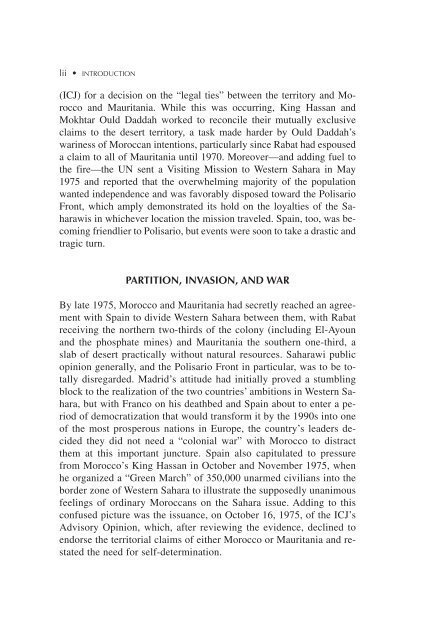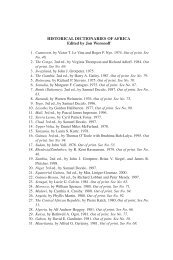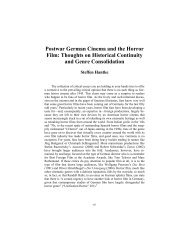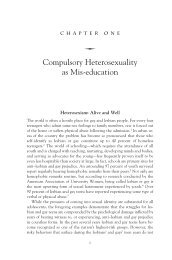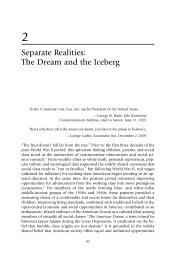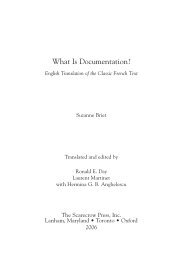Historical Dictionary of Western Sahara Third ... - Scarecrow Press
Historical Dictionary of Western Sahara Third ... - Scarecrow Press
Historical Dictionary of Western Sahara Third ... - Scarecrow Press
You also want an ePaper? Increase the reach of your titles
YUMPU automatically turns print PDFs into web optimized ePapers that Google loves.
lii • INTRODUCTION<br />
(ICJ) for a decision on the “legal ties” between the territory and Morocco<br />
and Mauritania. While this was occurring, King Hassan and<br />
Mokhtar Ould Daddah worked to reconcile their mutually exclusive<br />
claims to the desert territory, a task made harder by Ould Daddah’s<br />
wariness <strong>of</strong> Moroccan intentions, particularly since Rabat had espoused<br />
a claim to all <strong>of</strong> Mauritania until 1970. Moreover—and adding fuel to<br />
the fire—the UN sent a Visiting Mission to <strong>Western</strong> <strong>Sahara</strong> in May<br />
1975 and reported that the overwhelming majority <strong>of</strong> the population<br />
wanted independence and was favorably disposed toward the Polisario<br />
Front, which amply demonstrated its hold on the loyalties <strong>of</strong> the <strong>Sahara</strong>wis<br />
in whichever location the mission traveled. Spain, too, was becoming<br />
friendlier to Polisario, but events were soon to take a drastic and<br />
tragic turn.<br />
PARTITION, INVASION, AND WAR<br />
By late 1975, Morocco and Mauritania had secretly reached an agreement<br />
with Spain to divide <strong>Western</strong> <strong>Sahara</strong> between them, with Rabat<br />
receiving the northern two-thirds <strong>of</strong> the colony (including El-Ayoun<br />
and the phosphate mines) and Mauritania the southern one-third, a<br />
slab <strong>of</strong> desert practically without natural resources. <strong>Sahara</strong>wi public<br />
opinion generally, and the Polisario Front in particular, was to be totally<br />
disregarded. Madrid’s attitude had initially proved a stumbling<br />
block to the realization <strong>of</strong> the two countries’ ambitions in <strong>Western</strong> <strong>Sahara</strong>,<br />
but with Franco on his deathbed and Spain about to enter a period<br />
<strong>of</strong> democratization that would transform it by the 1990s into one<br />
<strong>of</strong> the most prosperous nations in Europe, the country’s leaders decided<br />
they did not need a “colonial war” with Morocco to distract<br />
them at this important juncture. Spain also capitulated to pressure<br />
from Morocco’s King Hassan in October and November 1975, when<br />
he organized a “Green March” <strong>of</strong> 350,000 unarmed civilians into the<br />
border zone <strong>of</strong> <strong>Western</strong> <strong>Sahara</strong> to illustrate the supposedly unanimous<br />
feelings <strong>of</strong> ordinary Moroccans on the <strong>Sahara</strong> issue. Adding to this<br />
confused picture was the issuance, on October 16, 1975, <strong>of</strong> the ICJ’s<br />
Advisory Opinion, which, after reviewing the evidence, declined to<br />
endorse the territorial claims <strong>of</strong> either Morocco or Mauritania and restated<br />
the need for self-determination.


